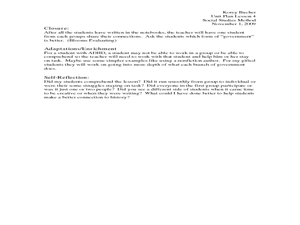Curated OER
Creating a Government
A simulation gives scholars a personal look at what goes into forming a government. Each of them is assigned 1 of 4 tribes which make up Borka, a hypothetical country. The tribe distribution is based on the percentage of people in each....
Curated OER
Who's The Boss?
Upper elementary and middle schoolers research and analyze some different types of governments. Democracies, Monarchies, and Dictatorships are some of the types that are looked at. Learners use the Internet to gather information that...
School Improvement in Maryland
Types of Economic Systems
As an introduction to economics, government classes investigate different types of economic systems (traditional, command, market or capitalist, mixed) to determine answers to basic question about how goods are produced.
iCivics
Tribal Government: High School
Did you know there are 567 federally recognized American Indian and Native Alaskan tribes and villages in the United States alone? The resource helps break down the complexities of many different tribal societies to explain the concept...
Curated OER
Lesson 4: The Judiciary: A Brief Introduction to the Courts System
Focusing on the judicial branch of government, the fourth lesson in this series explores the structure of the US courts system. Beginning with an engaging activity based on the short story The Lady or the Tiger, learners go on to examine...
Curated OER
The Three Branches of Government
Middle schoolers complete a unit on the three branches of government. They compare/contrast the three branches of government, write a letter or e-mail to an executive in the Federal Government, and develop outlines for historical...
Curated OER
An Introduction to Law
With so many different types of law, it can be difficult for learners to discern which is which! Use a newspaper to give tangible examples of various types of law, including criminal, civil, consumer, family, local, state, federal and...
Curated OER
Types of Branches
Fourth graders study the three branches of government. In this politics lesson, 4th graders list the three branches of government, understanding what each branch does, and compare and contrast how government is run with how the school is...
School Improvement in Maryland
Political Systems: Advantages and Disadvantages
Every political system has advantages and disadvantages. To gain an understanding of these differences, groups investigate the political system of another country—oligarchy, monarchy, dictatorship, parliamentary—and prepare a...
Curated OER
Government
Second graders run for various offices. They dress up like a politician, pretend to be running for an office, and tell the students why they should vote for him/her. They explain why it is necessary for a community to have a government
Curated OER
Indiana Courts: How Do They Work?
Young scholars identify the branches of Indiana's judicial system and determine the differences between the different courts and different types of cases. Students create a flow chart showing how a court case works its way through the...
iCivics
Step Five: All about Public Policy
Public policy is important to understand because it affects everyone. The resource tells middle schoolers how the government uses policy to accomplish goals in the administration. It includes a reading, true or false worksheet, a...
Curated OER
Lessons from the Holocaust
Middle schoolers discover what a dictatorship is by examining the holocaust. In this government lesson, students discuss the laws that were enacted for Nazis to take control of Germany, and the types of laws we have put place to prevent...
Curated OER
The Constitution: The Head of State
Learners explore politics by participating in a round-table discussion with classmates. In this monarchy lesson, students identify the different political leaders in Australia and conduct a class discussion about the country. Learners...
Curated OER
FROM STUDENT TO GLOBAL CITIZEN
Learners develop an awareness of citizenship and how it's defined globally. They explore the cultural diversity of different types of communities around the world. In addition, they assess the rights and responsibilities that are...
School Improvement in Maryland
Court Proceedings Civil Cases
What's the difference between civil and criminal law? How do the court proceedings differ in these two types of trials? How do the standards of proof differ? Why do these differences exist? As part of their examination of the US court...
C-SPAN
Primary and Secondary Sources: Trailblazers in Congress
Trailblazers forge the path into uncharted territory, they establish a precedent for others to follow. Young historians research trailblazers in Congress using primary and secondary sources to profile outliers that changed the face of...
Stanford University
Great Society
Students explore the Great Society. In this U.S. history and government instructional activity, students view the video "The Great Society," identify the major points of the speech, and compare and contrast the content with The New Deal.
National Endowment for the Humanities
Revolution '67, Lesson 2: What Happened in July 1967? How Do We Know?
Even in a world in which dozens of participants and curious onlookers record every controversial event, the basic facts of what happened are often in dispute. Revolution '67, Lesson 2 explores 1967 Newark, New Jersey using an examination...
Curated OER
White Collar Crime
Students discuss difference between crimes of deceit versus crimes of violence, define white-collar crime, and examine far reach of white collar crime laws. Students then analyze what differences exist between rationales for punishing...
C-SPAN
Should States Shift to Mail-In Voting during the Coronavirus Pandemic?
With the coronavirus pausing many norms in American society, officials are trying to decide how to safely hold voting in the 2020 presidential election. Using curated video clips, including speeches from Congress, journalists, and...
Curated OER
Donkeys and Elephants and Voters, Oh My!
Learners celebrate party politics. In this American politics instructional activity, students discover what the 2 main political parties in the country are and discuss their functions. Learners then participate in a classroom simulation...























